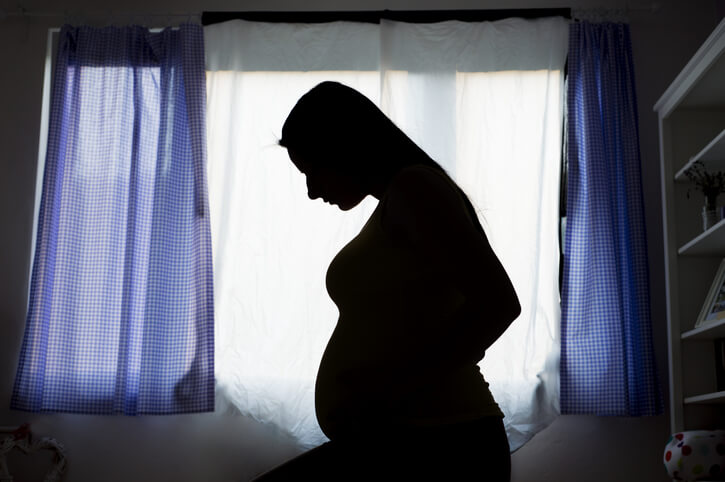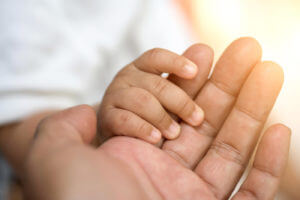For pregnant women in prison, their baby’s outlook may seem uncertain. After all, what happens when you have a baby in jail, and what are your options for giving your baby the best life you can?
Fortunately, when you’re pregnant in jail, you have the same opportunity to give your child the best opportunities possible by choosing a prison adoption for them. While each woman’s situation is unique, if you anticipate giving birth in prison and serving a long sentence, you might want to consider a prison infant adoption for the best interest of your baby.
If you know you’ll be pregnant in prison, you’ll want to work closely with your prison caseworker once your intake is completed. If you still have time before your intake, it’s a good idea to reach out to adoption professionals to learn more about what options are available to you and how exactly a prison adoption will work.
To help you learn more about choosing adoption for your prison pregnancy, here are the answers to some questions you may be asking:
1. How does a prison adoption work?
While there will obviously be differences between your adoption and an adoption for a woman who’s not in prison, most of the process remains the same. You will be able to create an adoption plan that you’re comfortable with (based on your prison policies and individual situation). You will be able to choose an adoptive family for your baby, receive financial assistance for your pregnancy-related expenses, share contact with your baby’s adoptive family and have certain birth mother rights, even though you are a pregnant inmate.
2. How do I decide that adoption is right for me?
Choosing adoption for a baby is a difficult decision to make and, when you’re pregnant in prison, it can be an even more complicated decision. However, when you’re in prison, you will be assigned a prison caseworker who you can talk to about your pregnancy options. They will offer you the information you need to make the best choice for your baby and help you move forward with that pregnancy option.
While deciding on a prison adoption can be emotional, it’s important that you don’t make this decision out of fear but out of an understanding of how adoption can benefit your baby. For example, placing your child for adoption will give them an opportunity for a stable, loving home that you cannot provide as an inmate. Your baby will know all about your selfless decision of adoption, and they’ll respect and love you for giving them their best chance at life.
3. How do I find adoptive parents for my baby while I’m pregnant in jail?
Your incarceration does not prevent you from choosing the perfect adoptive family for your baby. Once you are connected with an adoption professional, you’ll speak with your prison caseworker and a social worker from that adoption professional to detail what your preferences are for an adoptive family (for example, where they live, what their lifestyle is like, etc.). From there, the adoption professional will send you adoptive family profiles, where you can see photos of the family and learn more about who they are. While you likely won’t have the chance to meet them or ask them questions directly before you choose them, your prison caseworker will be able to answer any further questions you might have.
4. Will I be able to have contact with my baby’s adoptive parents?
Most pregnant women in prison are able to have semi-open adoptions, which mean they receive photos and letters of their child after the adoption process is complete. Exactly how much contact you can have with the adoptive family during and after the adoption process will depend on your unique circumstances, including your security level and your sentence length.
Your prison caseworker will make sure you understand exactly what your semi-open adoption will include. The adoptive family will pay for all of your contact expenses, including any phone calls you make to them and any stamps and paper you have to purchase from commissary to send them letters.
Whether or not you have any contact with the adoptive family when you give birth to your baby will also depend on your unique circumstances, which your prison caseworker will discuss with you when you create your hospital plan.
5. How much will my prison adoption cost me?
When you’re pregnant in prison and choose adoption, the entire process will be free to you. You will receive free emotional and legal counseling throughout your adoption process, and all of your adoption fees will be covered by the adoptive parents.
While you likely won’t be eligible for financial assistance for living expenses like food and rent (these and your medical expenses will be covered by the prison), you may be able to receive minimal financial assistance to purchase items from commissary that may make your pregnancy more comfortable. For example, you may be provided money to purchase stamps for communication with the adoptive family or extra food to combat your pregnancy cravings.
6. How will I give birth to my baby in jail?
You and your prison caseworker will create a hospital plan together, which will detail how the birth of your baby will proceed. You’ll be moved to a local hospital, and your prison officials will likely monitor you throughout your hospital stay. Whether or not you can meet the adoptive family during this hospital stay will depend upon your individual situation.
After you give birth to your baby, you will likely have the opportunity to spend the next 48 hours recovering with them in the hospital. It will be during this time that you’ll sign your adoption consent paperwork. Your adoption lawyer will visit you at the hospital and make sure you understand your legal rights before you make this permanent decision. When you’re ready, they’ll help you sign your adoption consent. Any other paperwork needed by the adoption attorney will likely be completed while you are still pregnant in jail.
7. What about my baby’s father?
Whether or not your baby’s father is supportive of your pregnancy and your adoption plan will likely impact how you proceed with your prison pregnancy. For example, if your baby’s father is supportive of your pregnancy and willing, you may wish to let him care for the baby after he or she is born. However, you should fully consider whether that would be the best environment for your baby to grow up in before choosing to let this man raise your child while you’re in prison.
If you decide on a prison adoption, your adoption attorney will work with you to learn more about your situation with your baby’s father and determine what kind of consent may be necessary from him. If his consent is needed, your attorney will take the necessary legal steps to obtain it.
8. How do I choose a professional for my prison adoption?
If you’re considering adoption for your baby in jail, your prison caseworker will work closely with you to find an adoption professional that’s right for you. Many prisons will provide you referrals to adoption professionals they commonly work with, but you always have the right to choose an adoption professional that you feel is right for you.
If you know you will be giving birth in prison and are considering adoption before your intake, it would be a good idea to contact potential adoption professionals beforehand to figure out which one might be best for you. If you find out that you’re pregnant in prison, or you know someone who is pregnant in prison, know that it can be more difficult to research adoption professionals once incarcerated. Therefore, it’s important that a pregnant woman be her own advocate by asking if she can do research on adoption professionals from within the prison and, if not, by enlisting a friend or family member to do research for her.
Choosing the right professional for your adoption is a huge part of ensuring a successful adoption, so it’s important that you take the proper steps to make the right choice for you and your baby. If you’re not yet in prison, you can learn more from these professionals:
9. What are my other options if I’m pregnant in prison?
Adoption is never your only option if you’re facing an unplanned pregnancy, and being pregnant in prison doesn’t change that. However, because you will serve time after you give birth, your options will be different than those of a woman who is not in prison.
If you are serving a short sentence and are confident you can raise a child in a healthy environment after you are released, you may want to place your child in a temporary guardianship with a friend or family member until you are released. For a more permanent solution, you may wish to place your child for adoption with a friend or family member, although this situation will come with unique challenges. Before you make the decision to give custody of your baby to someone you know, you’ll need to consider whether that person can provide your child the supportive and healthy environment they need.
Some prisons provide options for pregnant women who don’t have a long sentence. If your prison has the option, you may be able to care for your baby in a prison nursery and enroll in a prison program that prepares you for motherhood and your life post-incarceration. However, if your prison does not offer these programs, you will not be able to keep your child with you after birth.
It’s important to know that unless you make a plan for your baby’s care after they’re born, the state foster system will likely take custody of your child. While there are foster parents and people who may wish to adopt your baby, there’s also an uncertainty in the foster care system when it comes to who will adopt your child, how long they’ll wait to be adopted and what their life will be like. While you may be able to complete a plan for reunification with your baby after you’re released from prison, this will depend upon your individual situation. If the Department of Social Services determines you cannot complete a reunification plan, your parental rights may be terminated. To avoid this uncertainty for your baby, you might want to consider a planned prison infant adoption.
10. Can someone adopt my child if I am in jail?
Sometimes, women are incarcerated after they’ve had a child. Whether the child is still an infant or older, they may wonder whether they can transfer their parental rights to someone else, especially if they are serving a long sentence. Even those these women are currently incarcerated, they still have the right to place their child for adoption. If these are your circumstances, your prison caseworker will work with you and a lawyer to determine what kind of adoption process or custody change is possible in your situation.
11. Can you go to jail for giving a child up for adoption?
Whether you’re currently in prison or entering prison soon, you may wonder whether placing your child for adoption has any negative legal repercussions, like extending your sentence. If you’re not currently in prison, you may worry that placing a child for adoption may be illegal.
It’s important to know that adoptions completed legally with the help of an attorney will not threaten your record. In fact, choosing to place your child with a screened and prepared adoptive family actually helps you avoid any legal issues from child abandonment or neglect if you choose to place your child with someone else without the help of a professional. Choosing adoption will not result in negative legal consequences for you as a pregnant woman.
Being pregnant in jail is far from an ideal situation, but you will always have the option to choose what’s best for your baby, whether that’s adoption or another path. It’s important that all pregnant women in prison become their own advocate, as they are the only ones who can decide what’s right for them and their baby. Your prison caseworker will be able to work closely with you throughout this entire process, making sure you have the information and the resources you need. Any adoption professional you choose will empathize with your circumstances and will never judge you for choosing adoption if you’re pregnant in jail.
To get started with the adoption process in prison, either contact an adoption professional or speak with your prison caseworker. You can also begin browsing adoptive family profiles at any time to begin your search for the perfect adoptive parents for your child.











![Placing Siblings for Adoption [Sibling Adoption Guide] Placing Siblings for Adoption [Sibling Adoption Guide]](https://adoption-for-my-baby.com/wp-content/uploads/2020/10/Placing-Siblings-Together-300x200.jpg)
![Religion, Unplanned Pregnancy & Adoption [What to Know] Religion, Unplanned Pregnancy & Adoption [What to Know]](https://adoption-for-my-baby.com/wp-content/uploads/2020/10/Religious-Views-on-Adoption-300x200.jpg)
